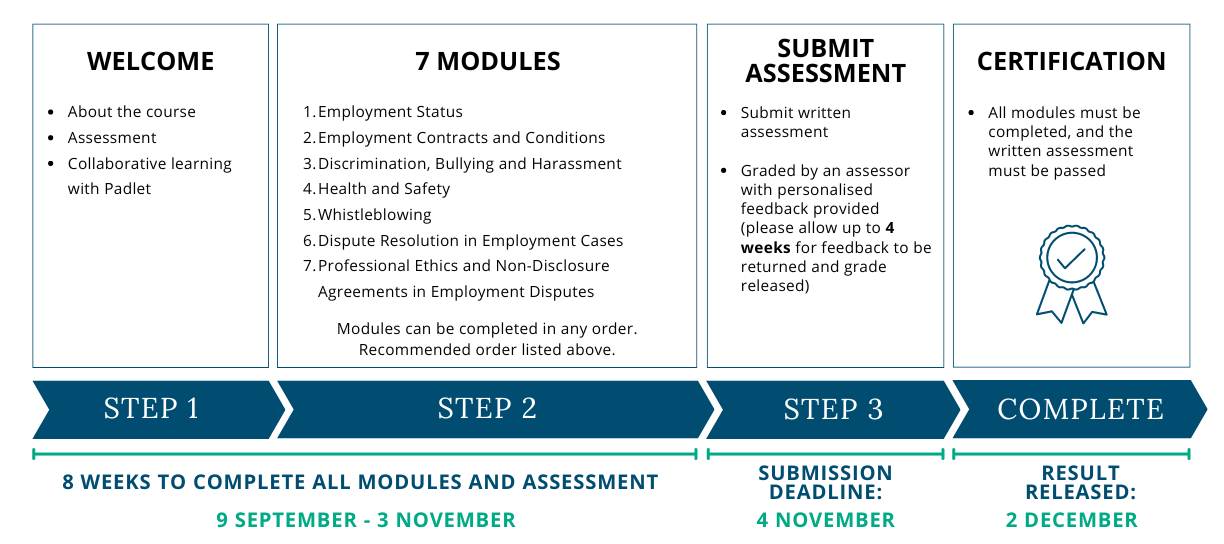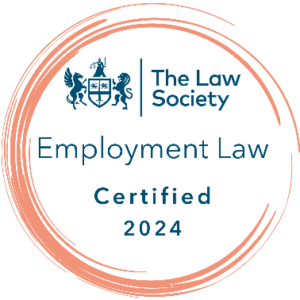Employment , Civil advocacy | Microcredential
Employment Law Microcredential (9 September 2024)
Course dates: 9 September 2024 – 3 November 2024
Assessment Submission: 4 November 2024 at 5pm
Results: 2 December 2024
Employment law plays a crucial role in protecting the rights of both employees and employers, establishing the legal framework that governs workplace relationships. It helps foster a productive and respectful work environment by safeguarding against discrimination, harassment and providing guidelines for resolving disputes and grievances. Legal practitioners, therefore, need to understand how to advise both employers and employees so that they can effectively maintain compliance with regulations and mitigate risks.
Through seven easy-to-read modules you will explore topics such as employment status, contracts and conditions, discrimination, whistleblowing, and much more. You will also have the opportunity to delve into key procedural stages during dispute resolution in employment cases, gain insights into ethical issues in employment tribunal advocacy, and the use of non-disclosure agreements in employment documentation.
Whether you are new to the employment law practice, seeking a refresher after a few years of experience, returning to the profession after a career break, or wish to expand your knowledge of the black-letter law governing employment cases, this extensive course offers something for you.
Enrol now to avoid disappointment!
For bulk purchase discounts on this training, please contact us. Please note that this course has limited space and due to the nature of the programme, the course must be completed within the dates specified. It cannot be mixed and matched with other offerings.
Who this is for
Junior lawyers, Small firms lawyers, Solicitors.
Learning outcomes
SRA competence: +3 more for SRA competence: A2, A3, A4, A5
After completing this course, you will be able to:
- analyse the differences between various employment statuses, associated legal implications, and future changes
- describe how contracts are created, define key terms, and understand the role of grievance processes
- understand the protected characteristics under the Equality Act 2010 and how to guide employers on managing discrimination claims
- explain the health and safety responsibilities of employers and employees, the core principles of risk assessment, and the ways in which health and safety law is enforced
- describe protected disclosures, identify legal protections for whistleblowers, understand the role of regulators, and provide employers with guidance on managing whistleblowers
- examine the role of the Advisory, Conciliation and Arbitration Service (Acas), Early Conciliation and understand the process for making claims in Employment Tribunals and civil courts
- explore the SRA Code of Conduct for employment matters, examine ethical issues in employment tribunal advocacy, and understand the utilisation of non-disclosure agreements in employment documentation.
What this will cover
Employment Status (by Alicia Collinson, Jodie Hill, Roshni Punja)
This module examines the distinctions between different employment statuses, the associated legal implications and rights, and the future developments in employment status and their repercussions.
Employment Contracts and Conditions (by Max Winthrop)
This module looks at the creation and variation of employment contracts, including key terms, how terms may be implied, imposed or varied, and the impact of collective bargaining.
Discrimination, Bullying and Harassment (by Alicia Collinson, Jodie Hill, Ashmina Vekaria, Roshni Punja)
This module provides insight into the Equality Act 2010, covering protected characteristics, types of discrimination, bullying and harassment, victimisation, and disability protections, along with guidance for employers on managing discrimination claims and addressing workplace concerns.
Health and Safety (by Michael Appleby and Dr Louise Smail)
This module explores the health and safety responsibilities of employers and employees, the core principles of risk assessment and management, and the enforcement options available to regulators.
Whistleblowing (by Alicia Collinson, Jodie Hill, Annabelle Oliver, Roshni Punja)
This module explores the criteria and significance of protected disclosures, the legal protections for whistleblowers, the role of regulators like the SRA, and employer guidance on managing whistleblowing matters and strategies to mitigate reputational risks.
Dispute Resolution in Employment Cases (by Max Winthrop)
This module covers the roles of the Advisory, Conciliation and Arbitration Service (Acas) and Early Conciliation, the process for making claims in Employment Tribunals and civil courts, key procedural stages, drafting tribunal documentation, and challenging tribunal decisions through appeals.
Professional Ethics and Non-Disclosure Agreements in Employment Disputes (by Max Winthrop)
This module explains the SRA Code of Conduct for employment matters, ethical issues in employment tribunal advocacy, and the use of non-disclosure agreements in employment documentation.
How you will learn
Course format This course is self-paced and provides best-practice guidance by incorporating practical activities, collaborative tools, and interactive scenarios designed to boost your skills and help you remain competitive. It consists of an interactive presentation for each module with knowledge checks, reflection points, and scenarios throughout the course.
Knowledge checks feature throughout the course as an opportunity to test and apply your understanding. Please note, they do not form part of the assessment.
Assessment
There will be an open-book assessment comprised of scenario-based, essay-style questions. Your submission should be no more than 1,200 words in total.
You will receive the questions at the beginning of the course to allow for reflective learning. The assessment is designed to assess your knowledge and understanding of the content and learning outcomes covered within the course.
When the submission window opens, you will be able to enter your answer for each question onto the platform, review, and submit. You’re only allowed one submission attempt.
Assessment feedback
After you have successfully completed the course and submitted your assessment, you will receive a grade and personalised feedback. The personalised feedback will offer specific comments on your submission, highlighting strengths and areas for improvement. It will help you to understand your progress and identify areas that might need further development.
On passing your assessment, you’ll be awarded a digital credential as evidence of your achievement that can accompany you wherever your career takes you – a quality mark you can add to your website or promote on social media to show clients that you’re competent and compliant in core legal, professional and personal skills.
To pass the assessment, you must achieve a mark of 50%.
Assessment dates
The assessment deadline is 5pm on Monday 4 November 2024. You will receive final grades and personalised feedback on Monday 2 December 2024.
Online accessibility
Our modules conform to Web Content Accessibility Guidelines 2.1. However, some members may require an alternative version for accessibility purposes. This is available upon request via our contact us form.
Also, if you need alternative arrangements for submitting your assessment, please get in touch.
Meet the Experts
This microcredential was developed by eight industry experts.


